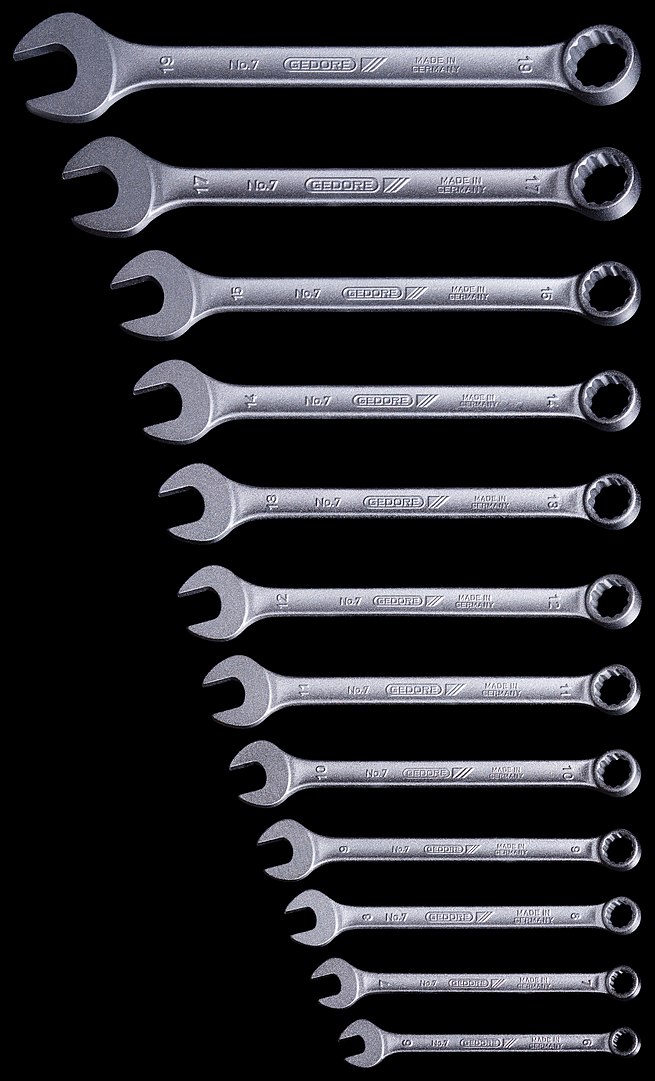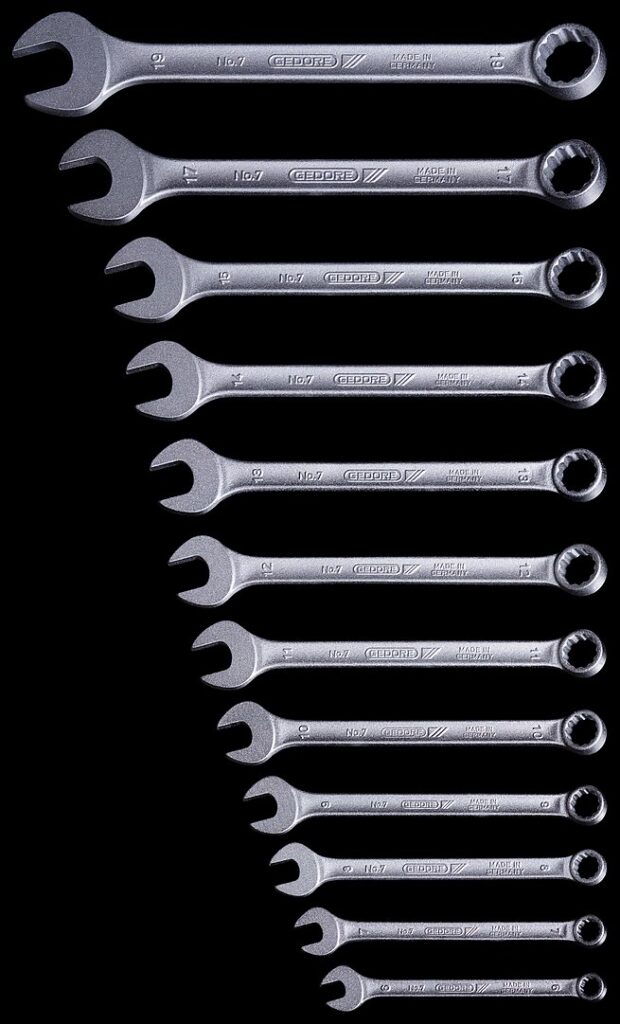
-
Wrench
A wrench or spanner is a tool used to provide grip and mechanical advantage in applying torque to turn objects—usually rotary fasteners, such as nuts and bolts—or keep them from turning.
In Commonwealth English (excluding Canada), spanner is the standard term. The most common shapes are called open-ended spanner and ring spanner. The term wrench is generally used for tools that turn non-fastening devices (e.g. tap wrench and pipe wrench), or may be used for a monkey wrench – an adjustable pipe wrench.In North American English, wrench is the standard term. The most common shapes are called open-end wrench and box-end wrench. In American English, spanner refers to a specialised wrench with a series of pins or tabs around the circumference. (These pins or tabs fit into the holes or notches cut into the object to be turned.) In American commerce, such a wrench may be called a spanner wrench to distinguish it from the British sense of spanner.
Higher quality wrenches are typically made from chromium-vanadium alloy tool steels and are often drop-forged. They are frequently chrome-plated to resist corrosion and for ease of cleaning.
Hinged tools, such as pliers or tongs, are not generally considered wrenches in English, but exceptions are the plumber wrench (pipe wrench in British English) and Mole wrench (sometimes Mole grips in British English).
The word can also be used in slang to describe an unexpected obstacle, for example, “He threw a spanner into our plans” (in U.S. English, “monkey wrench”).
-
Wrench (noun)
A movement that twists or pulls violently; a tug. From XVI century.
-
Wrench (noun)
An injury caused by a violent twisting or pulling of a limb; strain, sprain. From XVI century.
-
Wrench (noun)
A trick or artifice. From VIII century.
-
Wrench (noun)
Deceit; guile; treachery. From XIII century.
-
Wrench (noun)
A turn at an acute angle. From XVI century.
-
Wrench (noun)
A winch or windlass. From XVI century.
-
Wrench (noun)
A screw. From XVI century.
-
Wrench (noun)
A distorting change from the original meaning. From XVII century.
-
Wrench (noun)
A hand tool for making rotational adjustments, such as fitting nuts and bolts, or fitting pipes; a spanner. From XVIII century.
-
Wrench (noun)
An adjustable spanner used by plumbers.
-
Wrench (noun)
A violent emotional change caused by separation. From XIX century.
-
Wrench (noun)
In screw theory, a screw assembled from force and torque vectors arising from application of Newton’s laws to a rigid body. From XIX century.
-
Wrench (noun)
means; contrivance
-
Wrench (noun)
In coursing, the act of bringing the hare round at less than a right angle, worth half a point in the recognised code of points for judging.
-
Wrench (verb)
To violently move in a turn or writhe. From XI century.
-
Wrench (verb)
To pull or twist violently. From XIII century.
“With a surge of adrenaline, she wrenched the car door off and pulled out the injured man.”
-
Wrench (verb)
To turn aside or deflect. From XIII century.
-
Wrench (verb)
To slander. From XIV century.
-
Wrench (verb)
To tighten with or as if with a winch. From XVI century.
-
Wrench (verb)
To injure (a joint) by pulling or twisting. From XVI century.
“Be careful not to wrench your ankle walking along those loose stones!”
-
Wrench (verb)
To distort from the original meaning. From XVI century.
-
Wrench (verb)
To thrust a weapon in a twisting motion. From XVI century.
-
Wrench (verb)
To disarm an opponent by whirling his or her blade away. From XVIII century.
-
Wrench (verb)
To rack with pain. From XVIII century.
-
Wrench (verb)
To deprive by means of a violent pull or twist. From XVIII century.
-
Wrench (verb)
To use the tool known as a wrench. From XIX century.
“The plumber wrenched the pipes until they came loose.”
-
Spanner (noun)
A hand tool for adjusting nuts and bolts; a wrench.
“Pass me that spanner, Jake; there’s just one more nut to screw in.”
-
Spanner (noun)
One who, or that which, spans.
-
Spanner (noun)
A hand tool shaped like a small crank handle, for winding the spring of a wheel lock on a musket.
-
Spanner (noun)
A device in early steam engines for moving the valves for the alternate admission and shutting off of the steam.
-
Spanner (noun)
A problem, dilemma or obstacle; something unexpected or troublesome (in the phrase spanner in the works)
“Halfway through the production of Macbeth, the director found that the stage was smaller than he expected. This really threw a spanner in the works.”
-
Spanner (noun)
A stupid or unintelligent person; one prone to making mistakes, especially in language.
“You spanner, Rodney! I wanted a Chinese, not an Indian!”

